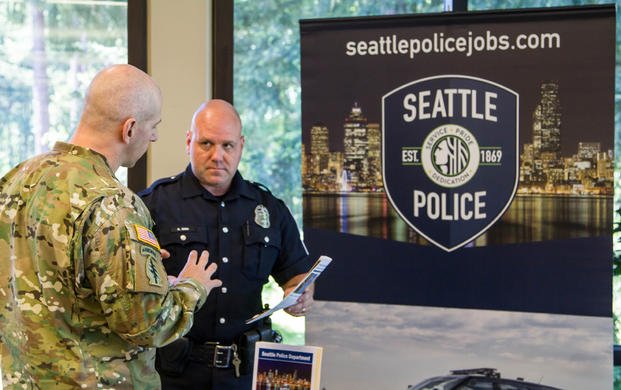Previously, I wrote about three important people you should know as you embark on a military to civilian transition. As part of a successful network, you should have contacts who are:
- Decision-makers -- People in a position to hire you, directly refer you to an opportunity or transact with you;
- Information sources -- Contacts who know things you don't: They have unique industry insight, are versed in techniques or skills you lack, or can supplement your knowledge on key aspects of your work or career; and
- Cheerleaders -- People who are supportive, encouraging and have a positive outlook on life and career.
These people will provide you with a well-rounded perspective on the job search and will encourage, inform and refer you to great opportunities.
In addition to these individuals, I also suggest you know three other types of contacts that will provide you access, insight and influence in your career: Gatekeepers, connectors and influencers.
Gatekeepers
The Merriam-Webster Dictionary defines a gatekeeper as "a person who controls access." When it comes to a successful transition, gatekeepers are people who can walk your resume into a hiring manager's office with a strong endorsement that you be considered. A gatekeeper might also be someone who can introduce you to an influencer (see below) or otherwise grant you access to information you otherwise couldn't obtain.
Consider this scenario:
Bob left his job as a combat medic in the Army and was interested in working as an editor with a publishing company that specialized in producing medical manuals. While he had exceptional, real-world training, he didn't have a medical doctor's degree, as most of their editors had.
One of Bob's childhood friends, however, knew the senior editor at the publishing company from their days at university and called him on Bob's behalf. He bypassed the normal hiring process and went straight to the senior editor and got Bob an interview, which led to a great job.
Bob's childhood friend, with whom he'd remained in touch, served as a valuable gatekeeper.
Connectors
Some people are naturally gifted at, and enjoy, connecting people to each other. They call themselves "connectors" or "networkers," and their ability to identify someone you should talk to is uncanny. Typically, they introduce like-minded individuals, people who share a common focus or passion, or who could benefit from expanding their circle of influence (or business or career) by meeting each other.
Where do you meet connectors? Everywhere! They are at networking events, business meetings, job fairs and even in the lobby at job interviews. When you meet someone who takes an interest in your career or transition and wants to introduce you to someone they know who might be of value to you, take them up on the offer.
Worst case, you make a new contact. Best case, you get a lead that helps you build a successful career.
Influencers
People with significant credibility, connections and influence are rare and very valuable. These people can introduce you with very little context, and the recipients will follow through simply because of who set the introduction. When influencers speak, others listen. They have earned respect and integrity within the networks they serve.
Influencers also have wide circles of influence. When being referred to someone by an influencer, stay open to the possibilities. If you're unsure why the influencer is introducing you to one of their contacts, ask for clarification and then trust that they see something in your future you might not be able to identify.
With all of these contacts, maintaining a mutually beneficial relationship is key. These people will want to help you, sometimes just out of their good nature and generosity. They might feel it is a way of thanking you for your service to our country.
Regardless of their motivation, always reciprocate with appreciation. A handwritten, thank-you note, a phone call or email to update them on your progress, or any gesture of appreciation (i.e., an invitation to coffee) is necessary and important to keep the relationship healthy and sustained.
Find the Right Veteran Job
Whether you want to polish your resume, find veteran job fairs in your area or connect with employers looking to hire veterans, Military.com can help. Sign up for a free Military.com membership to have job postings, guides and advice, and more delivered directly to your inbox.












